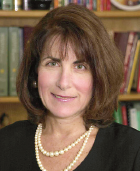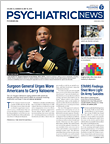While I always knew I wanted to be a physician, it wasn’t until a series of events occurred—both unfortunate and fortunate—that helped crystalize my desire to be a psychiatrist.
Beginning with the unfortunate:
My mother had been sick for about six years before she passed away in 1966, about a week after I completed high school. I was 16 and my sister was 13. I actually don’t know what she died from, but piecing the story together, I think she had been given bad medical care and probably had cervical cancer that had metastasized. In those days, having the “Big C” was very stigmatizing and frightening (as it is today in many instances). In fact, I think she was told she had arthritis, and when she received radiation, no one directly questioned this. My sister and I never met her doctor.
In my college freshman English class, we were asked to write about a recent memorable event, and I wrote about my mother’s passing; how depressed my sister, father, and I were; and how difficult it was to concentrate. The English professor wrote on the paper “Excellent”. How could this paper and my feelings be “excellent”? I guess I was hoping that someone would talk to me about how I was feeling, but that didn’t happen. I became very contemplative about what the possibilities could be for improved care for patients and families related to cancer and thought maybe I would be a hematologist/oncologist.
Now the fortunate:
In medical school at the University of Connecticut (UCONN), a fellow classmate and I were assigned during our eight-week, third-year psychiatry clerkship to an inpatient service at a local community hospital where there was also a robust ambulatory clinic and consultation-liaison service. We were so busy seeing patients, receiving excellent core lectures, and learning so much about being part of an inpatient multidisciplinary team that I found myself seriously considering psychiatry.
Mentors at UCONN—Drs. Allan Tasman, Mahlon Hale, David Goldberg, Roger Meyer, and Javier Escobar—all helped me think through what I could do in psychiatry. Dr. Hale organized an opportunity for me to be part of the UCONN Hemophilia Treatment Clinic, where psychiatric services were very much needed as the AIDS crisis was developing.
One of my first papers was about AIDS presenting as mania. A senior hematologist, Dr. Fred Rickles, facilitated my participation on the National Hemophilia Foundation (NHF) Psychosocial Committee and then an NHF Women’s Committee, because of the impact of Hemophilia/AIDS on women and families. It was a powerful experience and allowed me to see how I might mesh my interest in cancer and blood disorders with psychiatry. It also demonstrated the importance and power of working with patients and families, as well as large medical organizations.
I started reading about the new field of psychoncology, led by Dr. Jimmie C. Holland, and I remember the exact moment when Dr. Tasman informed me that Dr. Holland was a “she”—not a “he”—and that there was a new subspecialty in psychiatry where I could mesh oncology/hematology and psychiatry and perhaps try to make a difference. I should note that at the time there were very few female academic role models in psychiatry, and Dr. Tasman played a pivotal role in arranging for me to serve on the Women’s Academic Task Force at the Association for Academic Psychiatry (AAP).
When our family moved to Michigan, I was again fortunate to have strong mentors at the University of Michigan—Dr. John Greden, chair of the Department of Psychiatry, and Dr. Max Wicha, director of the Comprehensive Cancer Center, who both helped me build and direct its PsychOncology Program. It was also quite exciting when Dr. Holland turned over the chairmanship of the World Psychiatric Association’s Section on PsychOncology to me and my colleague, Dr. Luigi Grassi.
APA and its leaders have also been instrumental in my development. Mentors and long-time friends like Drs. Tasman, John Oldham, Leah Dickstein, Jack McIntyre, and Pedro Ruiz; colleagues who were resident leaders with me such as Doug Ziedonis, Patty Ordorica, and Saul Levin, M.D., M.P.A.; and friends like Drs. Tom Wise, Phil Muskin, Richard Balon, Edmond Pi, and Laura Roberts have made this journey an exceptional one. It has been a privilege to have served as president of the APA, as well as AAP and the American Association of Directors of Psychiatric Residency Training.
Psychiatry has afforded me so many exceptional experiences. For example, I have traveled the world as a member of the Executive Committee of the World Psychiatric Association. It has been a gift to mentor talented fellows in my capacity as the director of the University of Michigan Fellowship Training in Consultation-Liaison Psychiatry, and I thank Dr. Gregory Dalack for his support for so many years. We were just in Ghana to help develop a program to enhance mental health services and improve training in psychiatry for our residents. And I appreciate the leadership training I have received from ELAM (Executive Leadership for Academic Women).
I have also been so fortunate to have a wonderful and loving family—my husband, Arthur; daughters Alissa and Erica; son‑in‑law Jim; grandchildren Oscar and Jeanie; my sister and her family; devoted parents and grandparents; and friends who have been so nurturing. My colleagues and friends at the University of Michigan have been incredible partners.
With sincere gratitude and appreciation, my patients have been my guideposts, teaching me every day the importance of the incredible work we do in psychiatry. Most of my patients have cancer or a hematological disorder. They tell me that the psychosocial issues—anxiety, depression—are often harder to deal with than the underlying malignancy. I am very proud of the professional work we do and deeply appreciative for the opportunity to be a psychiatrist. ■
Psychiatric News invites you to share your story of why you aspired to be a psychiatrist. If you are interested, please send an email to
[email protected].

